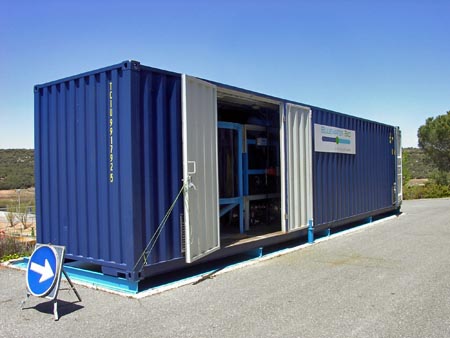HYBACS Wastewater Treatment Plant05/08/2009 | |
| Bluewater Bio International has installed its first wastewater treatment pilot plant in Spain. Bluewater Bio is developing the project with Aqualia GestiŁn Integral del Agua S.A. ("Aqualia"), a leading water company in Spain, and a subsidiary of multi-national utility company Grupo FCC. |
|
The project is supported by grant funding of nearly EUR90,000 to Aqualia Infraestructuras, an engineering subsidiary, from the Spanish Environment Ministry (Ministerio de Medio Ambiente, Medio Rural y Marino; MARM). The plant installation is part of Bluewater Bio's exclusive agreement signed last year with aqualia to promote the HYBACS technology.
The pilot plant, now commissioning at a municipal site in Ńvila, approximately 100km north-west of Madrid, is expected to serve as a reference for the subsequent implementation of this system in other aqualia facilities. The HYBACS (Hybrid Bacillus Activated Sludge) technology uses the naturally occurring bacteria bacillus to remove nitrogen, phosphorus and organic matter from a wide variety of wastewater streams to produce a very high-quality, odourless water resource that can be reused in many applications such as agriculture and industry.
Daniel Ishag said that the Spanish wastewater treatment market has immense potential for expansion and represents a key market for Bluewater Bio.
Compared with competing processes such as conventional nutrient removal activated sludge, HYBACS produces treated effluents with average BOD (biological oxygen demand) values typically less than 10 mg/l from domestic sewage and removes at least 98% of the BOD from concentrated industrial wastewaters. It also consumes up to 50% less energy, whilst offering CAPEX reductions of up to 30%, OPEX reductions of up to 45%, and a footprint that is up to 40% smaller. HYBACS is well-suited to upgrading existing plants, leveraging more than 80% of activated sludge infrastructure.
Effective nutrient removal from wastewaters prevents the overgrowth of algae in seas, estuaries, lakes and slow-flowing rivers, thereby avoiding the consequent eutrophication (or Ďsmothering') of aquatic life. Spanish municipalities are required by law to remove pollutants and organic matter from wastewaters, but legal action from the European Commission alleges that treatment practices in more than 400 cities and towns across the country are currently below the EU standard for nutrient removal. Under a current EU directive treatment plants must now be equipped with proper removal technologies that meet the most stringent quality and nutrient standards in sensitive zones at risk of eutrophication.
Spain for years has been grappling with a severe water shortage problem. The Spanish Environment Minister, Elena Espinosa, has pledged to promote the reuse of treated wastewater in sectors such as agriculture, and has launched a National Plan for Water Reuse to triple the level of wastewater reuse between 2010 and 2015.
Read more about: Reuse agriculture energy environment Industrial Supplier: Bluewater Bio More news from this supplier: Performance HYBACS Process Compatible With Nutrient Regulations Bluewater Bio Expands into South Africa Bluewater Bio to present at IWEX 2009 Gaining Trust in Water Projects NOM Removal Techniques Slovenian Paper and Board Association Joins CEPI Mine Water and Innovative Thinking Capital Planning and Operational Efficiency for Water Utilities Inventory of Small Hydrological Research Basins AQUAGIS Now ESRI Nederland Solutions Grontmij Restructures According to Business Lines Grontmij in Severn Trent Water Hydrogeology Framework GIS Water Modeling Technology for Ho Chi Minh City Comments (0):
|


 © 2010 Geomares Publishing Copyright reserved.
© 2010 Geomares Publishing Copyright reserved.